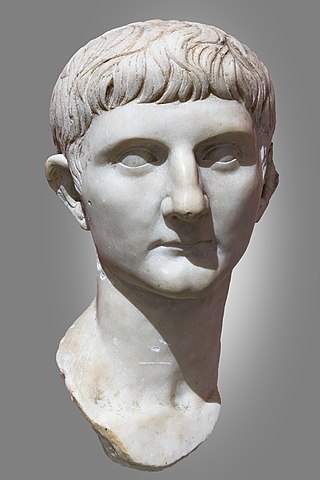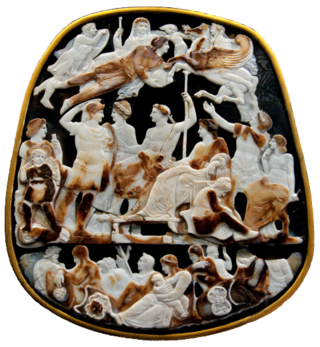Related Research Articles

(Vipsania) Agrippina the Elder was a prominent member of the Julio-Claudian dynasty. She was the daughter of Marcus Vipsanius Agrippa and Augustus' daughter, Julia the Elder. Her brothers Lucius and Gaius Caesar were the adoptive sons of Augustus, and were his heirs until their deaths in AD 2 and 4, respectively. Following their deaths, her second cousin Germanicus was made the adoptive son of Tiberius, Augustus' stepson, as part of the succession scheme in the adoptions of AD 4. As a result of the adoption, Agrippina was wed to Germanicus in order to bring him closer to the Julian family.

Germanicus Julius Caesar was an ancient Roman general and politician most famously known for his campaigns in Germania. The son of Nero Claudius Drusus and Antonia the Younger, Germanicus was born into an influential branch of the patrician gens Claudia. The agnomen Germanicus was added to his full name in 9 BC when it was posthumously awarded to his father in honor of his victories in Germania. In AD 4 he was adopted by his paternal uncle Tiberius, who succeeded Augustus as Roman emperor a decade later. As a result, Germanicus became an official member of the gens Julia, another prominent family, to which he was related on his mother's side. His connection to the Julii Caesares was further consolidated through a marriage between him and Agrippina the Elder, a granddaughter of Augustus. He was also the father of Caligula, the maternal grandfather of Nero, and the older brother of Claudius.

The Julio-Claudian dynasty comprised the first five Roman emperors: Augustus, Tiberius, Caligula, Claudius, and Nero.

The 20s decade ran from January 1, AD 20, to December 31, AD 29.
6 was a common year starting on Friday of the Julian calendar. In the Roman Empire, it was known as the Year of the Consulship of Lepidus and Lucius Arruntius. The denomination "AD 6" for this year has been used since the early medieval period, when the Anno Domini calendar era became the prevalent method in Europe for naming years.
This article concerns the period 19 BC – 10 BC.

The gens Julia was one of the most prominent patrician families in ancient Rome. Members of the gens attained the highest dignities of the state in the earliest times of the Republic. The first of the family to obtain the consulship was Gaius Julius Iulus in 489 BC. The gens is perhaps best known, however, for Gaius Julius Caesar, the dictator and grand uncle of the emperor Augustus, through whom the name was passed to the so-called Julio-Claudian dynasty of the first century AD. The nomen Julius became very common in imperial times, as the descendants of persons enrolled as citizens under the early emperors began to make their mark in history.

Drusus Julius Caesar was the son of Emperor Tiberius, and heir to the Roman Empire following the death of his adoptive brother Germanicus in AD 19.

Drusus Caesar was the adopted grandson and heir of the Roman emperor Tiberius, alongside his brother Nero. Born into the prominent Julio-Claudian dynasty, Drusus was the son of Tiberius' general and heir, Germanicus. After the deaths of his father and of Tiberius' son, Drusus the Younger, Drusus and his brother Nero Caesar were adopted together by Tiberius in September AD 23. As a result of being heirs of the emperor, he and his brother enjoyed accelerated political careers.

Nero Julius Caesar was the adopted grandson and heir of the Roman Emperor Tiberius, alongside his brother Drusus. Born into the prominent Julio-Claudian dynasty, Nero was the son of Tiberius' general and heir, Germanicus. After the deaths of his father and of Tiberius' son, Drusus the Younger, Nero and his brother Drusus were adopted together by Tiberius in September AD 23. As a result of being heirs of the emperor, he and his brother enjoyed accelerated political careers.
Lucius Apronius was a Roman senator and suffect consul in 8 AD.
The gens Caecinia was a plebeian family of Etruscan origin at ancient Rome. Members of this gens are first mentioned in the time of Cicero, and they remained prominent through the first century of the Empire, before fading into obscurity in the time of the Flavian emperors. A family of this name rose to prominence once more at the beginning of the fifth century.
Aulus Caecina Severus was a Roman politician and general who was consul in 1 BC. He was Emperor Augustus' representative in Moesia when the Great Illyrian Revolt broke out. As a result, he spent 4 years in heavy fighting against the Illyrian tribes before the revolt was suppressed by the Romans. In 14 AD he was in charge of several legions on the lower Rhine which mutinied on the death of Augustus. He was recorded as having handled this poorly, with the situation only being salvaged by the intervention of his commander-in-chief, Germanicus.

The gens Munatia was a plebeian family at Rome. Members of this gens are first mentioned during the second century BC, but they did not obtain any of the higher offices of the Roman state until imperial times.

The gens Plautia, sometimes written Plotia, was a plebeian family at ancient Rome. Members of this gens first appear in history in the middle of the fourth century BC, when Gaius Plautius Proculus obtained the consulship soon after that magistracy was opened to the plebeian order by the Licinio-Sextian rogations. Little is heard of the Plautii from the period of the Samnite Wars down to the late second century BC, but from then to imperial times they regularly held the consulship and other offices of importance. In the first century AD, the emperor Claudius, whose first wife was a member of this family, granted patrician status to one branch of the Plautii.
The gens Rubria was a plebeian family at ancient Rome. Members of this gens are first mentioned in the time of the Gracchi, but they did not rise to prominence until imperial times. The first of the Rubrii to obtain the consulship was Rubrius Gallus, some time before AD 68.
Lucius Visellius Varro was a Roman senator, who was active during the reign of Tiberius. He was consul in AD 24 as the colleague of Servius Cornelius Cethegus. He is best known for accusing Gaius Silius of being complicit in Sacrovir's revolt and misappropriating money from the provincial government in Gaul. His prosecution ended with Silius' death.
The gens Silia was a plebeian family at ancient Rome. Members of this gens are mentioned as early as the fifth century BC, but first to hold the consulship was Publius Silius Nerva, in the time of Augustus. The Silii remained prominent until the time of the Severan dynasty, in the early third century.
References
- ↑ Gordon and Gordon, "Roman Names and the Consuls of A. D. 13", American Journal of Philology, 72 (1951), pp. 283-292
- ↑ Syme, "The Consuls of A.D. 13", Journal of Roman Studies , 56 (1966), pp. 55-60
- ↑ Diana Gorostidi Pi, "Sui consoli dell’anno 13 d.C.: Nuovi dati dai fasti consulares Tusculani", Zeitschrift für Papyrologie und Epigraphik , 189 (2014), pp. 265-275.
- ↑ Christopher Burnand, Tacitus and the Principate: From Augustus to Domitian (2011), pg. 56
- ↑ Pat Southern, The Roman army: a social and institutional history (2007), pg. 294
- 1 2 3 Smith, p. 823
- ↑ Ludwig Heinrich Dyck, The Roman Barbarian Wars: The Era of Roman Conquest (2011), pg. 256
- ↑ Stephen Dando-Collins, Blood of the Caesars: how the murder of Germanicus led to the fall of Rome, (2008), pg. 96
- ↑ Tacitus, Annales III:40-42.
- ↑ David F. Burg, A world history of tax rebellions: an encyclopedia of tax rebels, revolts, and riots from antiquity to the present (2004), pg. 25
- ↑ Jasper Burns, Great women of Imperial Rome: mothers and wives of the Caesars (2007), pgs. 51-52
- ↑ Stephen Dando-Collins, Blood of the Caesars: how the murder of Germanicus led to the fall of Rome, (2008), pg. 97
- ↑ Jasper Burns, Great women of Imperial Rome: mothers and wives of the Caesars (2007), pg. 52